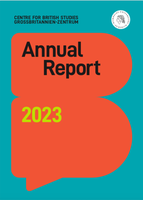Course Outline
The interdisciplinary approach of the Master in Brisith Studies was a great preparation for the diverse tasks at hand in my position, not to forget the fantastic experience of working abroad as an intern.
Tobias Schrank, Class 2009-2011
The interdisciplinary approach of the Master in Brisith Studies was a great preparation for the diverse tasks at hand in my position, not to forget the fantastic experience of working abroad as an intern.
Tobias Schrank, Class 2009-2011
Course Objectives
- to add competence in British Studies to qualifications acquired during their first degree course
- to prepare students for positions in firms and institutions in an international context
- to promote cross-cultural understanding, communication and mobility
- to teach students interdisciplinary methods and approaches enabling them to think and work contextually
- to provide students with an understanding of British society, culture, institutions and economy in a European perspective
Course structure
The postgraduate course is an interdisciplinary teaching programme over 2 years. Having successfully completed the Certificate Phase during the first year, students receive a British Studies certificate. After successful completion of the entire course, students are awarded the degree M.A. British Studies.
The Certificate Phase comprises about 30 weeks of teaching stretching over 2 semesters. The first semester (Core Programme) consists of a series of compulsory lectures and seminars. In the second semester (Options Programme) students can choose 3 out of 6 options (see course outline below). Students have to attend an average of at least 20 hours of classes per week. These may include suitable classes taught in other departments.
During the Master Phase students take part in advanced seminars including transdisciplinary optional modules, which can be chosen from other master programmes. As part of their work placement, they spend 3 months with a firm or institution in Britain or Ireland. The last 6 months of the Master Phase are dedicated to writing a thesis.
M.A. British Studies course outline
Certificate Phase
The obligatory part of the course consists of the following modules (including lectures, seminars, theme-oriented project works etc.):
- Introductory Module
- History
- Law, Economics, Politics
- Interdisciplinary Project I
- Career Skills: Academic Writing and Project Management
Thereafter, students are free to specialise by choosing three out of these six options:
- Interdisciplinary Project II
- Economics and Management
- Politics and Society
- Law in Context
- Media, History, and Culture
- Culture and Literature
Master Phase
Students attend the following Advanced Seminar modules:
- Advanced Academic Methods, Writing and Debating
- Advanced Seminars in British Studies (may be substituted for master courses at other institutes)
The Master Phase is completed by a 3-month work placement and a 6-month thesis.
Work Placements
We are also grateful to the numerous and prestigious British organisations that have supported us by providing placements for our students. These include the House of Commons, the National Museums of Scotland, the Roald Dahl Museum, the National Trust, Pearson Plc, the European Documentation Centre Cardiff, Birmingham City Council, Cheltenham Literature Festivals, the Henry Jackson Society, Brookside Publishing Dublin, Bath Festivals and the German-British Chamber of Commerce.
For more information on work placements click here: Work Placements
Grants
Applicants requiring financial support are strongly recommended to apply for a grant or scholarship well in advance. The deadlines for scholarship applications may be as early as in October the year before you plan to take up your studies at the Centre for British Studies!
Sponsorship suggestions for prospective students:
During the last years, many M.A.B.S. students received financial support from the Erasmus+ programme of the European Union for time spent in Britain. As Britain is currently not associated with the Erasmus programme, this support has now ended.
Career prospects
As part of our alumni activities, the Centre keeps track of our former students' professional careers. A summary of findings is available in our Annual Reports


